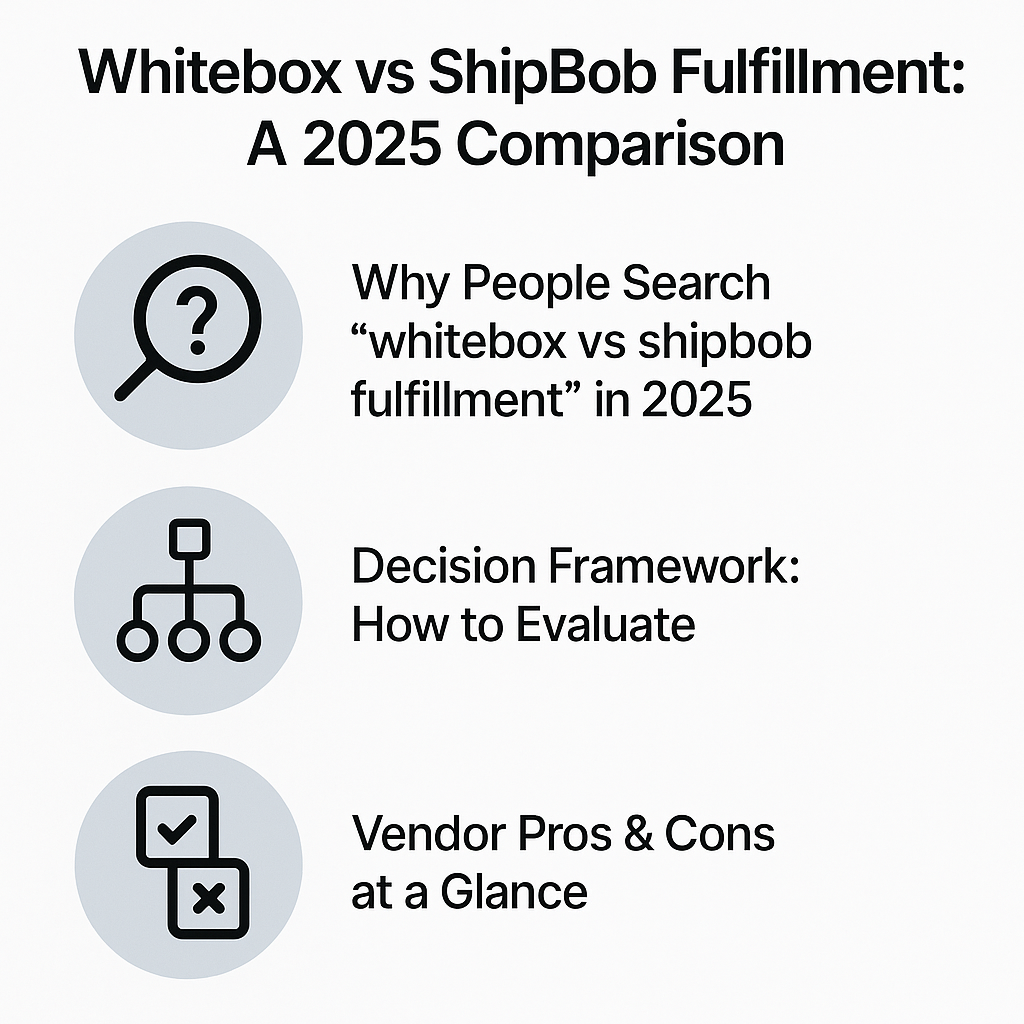
Whitebox vs ShipBob Fulfillment
Choosing between Whitebox and ShipBob fulfillment can be a daunting task for logistics managers and ecommerce founders. With evolving trends like AI forecasting and sustainability, the stakes are higher than ever. This guide will help you navigate these choices and make a confident decision.
Why People Search ‘whitebox vs shipbob fulfillment’ in 2025
In 2025, the logistics landscape is being reshaped by AI forecasting and sustainability demands. Companies are seeking 3PL partners that not only offer cost efficiency but also align with their environmental goals. Whitebox and ShipBob have emerged as key players, each offering unique advantages. The decision between them hinges on factors like technology integration, scalability, and eco-friendly practices.
- Consider how AI-driven insights can optimize your supply chain with each provider.
- Evaluate the sustainability initiatives of both Whitebox and ShipBob to align with your brand values.
- Assess the scalability of each provider to ensure they can grow with your business.
Decision Framework: How to Evaluate
When evaluating Whitebox vs ShipBob fulfillment, it’s crucial to establish a decision framework that aligns with your business objectives. Start by identifying your primary goals, whether it’s cost reduction, speed, or sustainability. Each provider offers distinct strengths, so mapping these to your priorities is essential.
Consider the technological capabilities of each provider. Whitebox may offer advanced AI tools for inventory management, while ShipBob might excel in multi-node distribution. Understanding these differences can guide your choice.
Finally, think about customer service and support. A provider that offers robust support can be invaluable, especially during peak seasons or unexpected disruptions.
- Define your primary fulfillment goals: cost, speed, or sustainability.
- Evaluate the technological tools offered by each provider.
- Consider the level of customer support and service reliability.
Vendor Pros & Cons at a Glance
- Whitebox Pros: Advanced AI tools, strong sustainability focus, customizable solutions.
- Whitebox Cons: Potentially higher costs, complex integration process.
- ShipBob Pros: Extensive network, competitive pricing, user-friendly platform.
- ShipBob Cons: Limited customization, less focus on sustainability.
Whitebox stands out with its advanced AI tools and sustainability initiatives, making it ideal for businesses prioritizing eco-friendliness. However, its higher costs and complex integration might be a drawback. ShipBob offers a more extensive network and competitive pricing, but its limited customization options may not suit all businesses.
Pricing & Total Landed Cost: What Really Moves the Number
Understanding the pricing structures of Whitebox and ShipBob is crucial for determining total landed costs. Both providers offer competitive pricing, but the key differences lie in their fee structures and additional services.
- Whitebox may have higher upfront costs due to its advanced technology and sustainability features.
- ShipBob often provides more predictable pricing with fewer hidden fees.
- Consider the impact of additional services, such as custom packaging or expedited shipping, on overall costs.
While Whitebox’s advanced features might justify its higher costs for some, ShipBob’s straightforward pricing can be appealing for businesses seeking budget predictability.
Feature-by-Feature Comparison
- Technology: Whitebox offers AI-driven inventory management; ShipBob provides a user-friendly platform.
- Network: ShipBob has a broader distribution network; Whitebox focuses on strategic locations.
- Sustainability: Whitebox leads with eco-friendly practices; ShipBob is less focused on green initiatives.
- Customization: Whitebox offers more tailored solutions; ShipBob provides standardized options.
Whitebox excels in technology and sustainability, making it suitable for tech-savvy and eco-conscious businesses. ShipBob’s extensive network and user-friendly platform cater to businesses prioritizing reach and simplicity.
Scenario Playbook: Who Should Choose What?
- Tech-Driven Businesses: Opt for Whitebox for its AI capabilities and customization.
- Cost-Conscious Startups: Choose ShipBob for its competitive pricing and extensive network.
- Eco-Friendly Brands: Whitebox’s sustainability initiatives make it the better choice.
- Fast-Growing Companies: ShipBob’s scalability and network are advantageous.
Whitebox is ideal for businesses that prioritize technology and sustainability, while ShipBob suits those looking for cost-effectiveness and scalability.
Onboarding & Risk Mitigation
Onboarding with a new 3PL can be a complex process. Whitebox may require more time due to its advanced technology integration, but it offers comprehensive support to mitigate risks. ShipBob, with its simpler platform, typically allows for quicker onboarding, making it suitable for businesses needing a fast transition.
Ensure you have a clear implementation plan and understand the support available from each provider to minimize disruptions during the transition.
Expert Take
In my experience, choosing between Whitebox and ShipBob often comes down to your business’s core values and growth stage. I once worked with a mid-sized ecommerce brand that chose Whitebox for its AI capabilities, which significantly improved their inventory accuracy. However, a startup I advised opted for ShipBob due to its cost-effective scalability. Both decisions were right for their respective needs, highlighting the importance of aligning your choice with your strategic goals.
Further Reading
FAQs
How do pricing models differ for ‘whitebox vs shipbob fulfillment’?
Whitebox typically involves higher upfront costs due to its advanced features, whereas ShipBob offers more predictable pricing.
What support model should I expect?
Whitebox offers comprehensive support for complex integrations, while ShipBob provides straightforward onboarding assistance.
Which industries benefit most?
Tech-driven and eco-conscious industries may prefer Whitebox, while startups and fast-growing companies might lean towards ShipBob.
How long does onboarding take?
Whitebox may take longer due to its complex systems, whereas ShipBob’s onboarding is generally quicker.
Can multi-node reduce both cost and transit time?
Yes, multi-node distribution can optimize costs and reduce delivery times, a strength of ShipBob’s extensive network.
Next Steps
Ready to make a decision? Compare quotes or schedule a consultation to see which provider aligns best with your business goals.

Leave a Reply